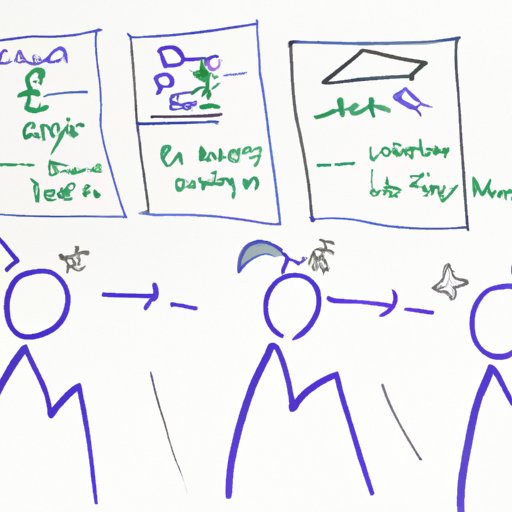Introduction
Withdrawing from a class is a decision that should not be taken lightly, as it can have a significant impact on your financial aid eligibility. It’s important to understand the potential consequences of withdrawing from a class and how it could affect your financial aid package. This article will explore the pros and cons of withdrawing from a class and the various ways it can impact your financial aid.

Definition of Withdrawing from a Class
Withdrawing from a class means dropping it after the add/drop period has ended. Generally, students are allowed to drop classes without any penalty during this time. After this period ends, students may still be able to drop classes, but they may face certain penalties such as a “W” (withdrawn) grade or a fee. Additionally, dropping a class after the add/drop period can negatively affect a student’s financial aid eligibility.
Overview of Financial Aid
Financial aid is money provided by the government, colleges, universities, and other organizations to help students pay for college. Typically, financial aid packages consist of grants, scholarships, work-study programs, and loans. Grants and scholarships are typically based on academic merit or financial need, while loans must be repaid with interest. Work-study programs allow students to earn money to help pay for college expenses.
Pros and Cons of Withdrawing from a Class and its Impact on Financial Aid
There are both pros and cons to withdrawing from a class. On the one hand, it can provide relief from a difficult course or allow students to focus their attention on other courses. On the other hand, withdrawing from a class can have a negative impact on a student’s financial aid eligibility.
Pros
Withdrawing from a class can provide relief from a difficult course or allow students to focus their attention on other courses. It can also give students the opportunity to retake the course at a later date when they have more time and resources to devote to it. Additionally, if a student withdraws from a class before the midpoint of the semester, they will not receive a grade for the course, which can help to maintain a higher GPA.
Cons
The main con of withdrawing from a class is that it can have a negative impact on a student’s financial aid eligibility. Depending on the school’s policies, withdrawing from a class can result in a loss of tuition assistance, changes in loan repayment terms, and an impact on scholarships. Additionally, withdrawing from a class may also cause a student to lose their academic standing or fail to meet satisfactory academic progress requirements.

How to Determine if Withdrawing from a Class Will Affect Your Financial Aid
When considering withdrawing from a class, it’s important to understand how it could affect your financial aid eligibility. The best way to determine this is to speak with an advisor or financial aid officer at your school. They can provide you with information about the school’s policies and how withdrawing from a class may affect your financial aid package.
Speak with an Advisor
Speaking with an advisor or financial aid officer at your school is the best way to determine if withdrawing from a class will affect your financial aid eligibility. They can provide you with information about the school’s policies and how withdrawing from a class may affect your financial aid package.
Evaluate Your Financial Aid Package
It’s also important to review your financial aid package to understand what types of aid you are receiving and how withdrawing from a class could affect it. For example, if you are receiving grants or scholarships, withdrawing from a class may mean that you are no longer eligible for those funds. Additionally, if you are receiving loans, withdrawing from a class may mean that you have to start repaying them sooner or at a higher interest rate.
Understand Your Responsibilities as a Student
Finally, it’s important to understand your responsibilities as a student. Many schools have policies that require students to maintain a certain number of credits each semester in order to remain eligible for financial aid. If you withdraw from a class, you may no longer be meeting these requirements, which could result in the loss of your financial aid eligibility.

Exploring the Financial Consequences of Withdrawing from a Class
As mentioned above, withdrawing from a class can have a significant impact on your financial aid eligibility. Here are some potential consequences to consider:
Potential Loss of Tuition Assistance
If you are receiving tuition assistance such as grants or scholarships, withdrawing from a class may mean that you are no longer eligible for those funds. This can significantly reduce your financial aid package and make it more difficult to pay for college.
Changes in Loan Repayment Terms
If you are receiving loans, withdrawing from a class may mean that you have to start repaying them sooner or at a higher interest rate. This can significantly increase the amount of money you have to repay over the life of the loan.
Impact on Scholarships
Finally, withdrawing from a class may also impact your eligibility for scholarships. Many scholarship programs require students to maintain a certain GPA or take a certain number of credits each semester in order to remain eligible for funding. If you withdraw from a class, you may no longer be meeting these requirements, which could result in the loss of your scholarship.
What You Need to Know About Withdrawing from a Class and Financial Aid
When considering withdrawing from a class, it’s important to understand how it could affect your financial aid eligibility. Here are some things to keep in mind:
Review School Policies
Each school has different policies regarding financial aid eligibility and withdrawing from a class, so it’s important to familiarize yourself with your school’s policies. Speak with an advisor or financial aid officer to get a better understanding of how withdrawing from a class could affect your financial aid eligibility.
Understand Academic Standing Requirements
Many schools have academic standing requirements that students must meet in order to remain eligible for financial aid. These requirements may include maintaining a certain GPA, taking a certain number of credits each semester, and passing a certain number of courses. If you withdraw from a class, you may no longer meet these requirements, which could result in the loss of your financial aid eligibility.
Understand Satisfactory Academic Progress
In addition to academic standing requirements, many schools also require students to maintain satisfactory academic progress in order to remain eligible for financial aid. This includes completing a certain number of credits each semester and maintaining a certain cumulative GPA. If you withdraw from a class, you may no longer meet these requirements, which could result in the loss of your financial aid eligibility.
Tips for Navigating the Process of Withdrawing from a Class and Your Financial Aid
When considering withdrawing from a class, it’s important to understand how it could affect your financial aid eligibility. Here are some tips to help you navigate the process:
Talk to Your Financial Aid Office
The best way to determine if withdrawing from a class will affect your financial aid eligibility is to speak with an advisor or financial aid officer at your school. They can provide you with information about the school’s policies and how withdrawing from a class may affect your financial aid package.
Make Sure to Include All Deadlines
It’s important to pay attention to all deadlines when withdrawing from a class. Make sure to submit all paperwork on time and follow up with the financial aid office to ensure that your withdrawal is processed correctly. Failing to do so may result in the loss of your financial aid eligibility.
Consider Alternative Options
Finally, if you are considering withdrawing from a class, it’s important to explore alternative options first. Speak with your professor or an advisor to see if there are any other ways to get through the course. You may also want to consider taking a less demanding course or enrolling in an online course. These options may help you stay on track and avoid the potential consequences of withdrawing from a class.

Understanding the Impact of Withdrawing from a Class on Financial Aid
When considering withdrawing from a class, it’s important to understand the potential short-term and long-term impacts on your financial aid eligibility. Here are some things to keep in mind:
Short-Term vs. Long-Term Impact
The short-term impact of withdrawing from a class is generally limited to the loss of tuition assistance and changes in loan repayment terms. However, the long-term impact of withdrawing from a class can be much more significant. It can result in a loss of academic standing, failure to meet satisfactory academic progress requirements, and an inability to receive additional financial aid in the future.
Understanding the Eligibility Requirements
It’s important to understand the eligibility requirements for financial aid. Many schools have policies that require students to maintain a certain number of credits each semester in order to remain eligible for financial aid. Additionally, some schools require students to maintain a certain GPA and pass a certain number of courses in order to remain eligible for financial aid. Withdrawing from a class may mean that you no longer meet these requirements, which could result in the loss of your financial aid eligibility.
How to Balance Withdrawing from a Class and Retaining Financial Aid Eligibility
If you are considering withdrawing from a class, there are several steps you can take to balance your academic needs with your financial aid eligibility. Here are some tips:
Prioritize Education
First and foremost, it’s important to prioritize your education. Consider alternatives to withdrawing from a class such as speaking with your professor or taking a less demanding course. This can help you stay on track and avoid the potential consequences of withdrawing from a class.
Consider Other Funding Sources
If withdrawing from a class is necessary, it’s important to consider other funding sources. Research scholarships and grants that you may be eligible for and apply for them if you qualify. Additionally, look into loan options such as private loans or parent PLUS loans. These options can help to supplement your financial aid package and make up for any losses due to withdrawing from a class.
Utilize Resources Available
Finally, it’s important to utilize the resources available to you. Speak with an advisor or financial aid officer at your school to get a better understanding of how withdrawing from a class could affect your financial aid eligibility. Additionally, research online resources such as scholarships, grants, and loan options that may be available to you.
Conclusion
Withdrawing from a class can have a significant impact on your financial aid eligibility. It’s important to understand the potential consequences of withdrawing from a class and how it could affect your financial aid package. Speak with an advisor or financial aid officer at your school to get a better understanding of how withdrawing from a class could affect your financial aid eligibility. Additionally, consider alternative options such as speaking with your professor or taking a less demanding course. Finally, research other funding sources such as scholarships, grants, and loan options that may be available to you.
(Note: Is this article not meeting your expectations? Do you have knowledge or insights to share? Unlock new opportunities and expand your reach by joining our authors team. Click Registration to join us and share your expertise with our readers.)
